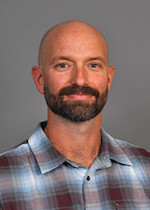Jason Duque

Professor
Education
Contact Information:
- jason@education.ucsb.edu
- Education 3210
Specialization
Teacher education; Educational philosophy; Educational equity; Learning; Anthropology; Social interaction; Social relations
Bio
Jason Duque is a Senior Lecturer with Security of Employment in the Department of Education and Teacher Education Program. As a researcher and teacher, three things move Dr. Duque: systematic inequities in schools; language as it rests at the heart of learning; and a struggle to find ways to speak (and write) clearly about the challenges of teaching, learning, and schooling in a context of cultural and linguistic diversity. How are schools able to make so much learning possible at the same time that so many kids get sorted out of school? How do the ways we use and think about language structure our experience as teachers and learners? And what might we take from the way things are to help us re-imagine how things could be?
When teaching fourth and fifth-graders in Long Beach and Carpinteria, Dr. Duque saw concretely the transformative power of reading and writing, of close attention to and immersion in language. He also saw how many kids either were left out of or walked away from schooling. He brought this mixture of hope and concern to his research, where he came to appreciate how human experience – including experience in school – gets organized by all of us, especially by the way we use and think about language when we are together. This sounded fine, except that it made it very hard to assign credit or blame, and it certainly made for few easy answers.
So, we organize the world for each other, and language has a lead role. Dr. Duque takes this basic assumption into his study of “safe” places and spaces, where people find it possible to take risks, to try out new roles and perspectives, and to come to own new ways of being and speaking. He keeps a particular focus on (1) the way people accomplish and negotiate these safe spaces in their talk with one another, and (2) the learning made possible there. He also has an abiding interest in research methodology. With training in interaction analysis and applied linguistics, as well as in the observation and interviewing of educational anthropology, he thinks and writes a good deal about out how various methods fit together and what tools and concepts we might use to better understand the world.
When teaching fourth and fifth-graders in Long Beach and Carpinteria, Dr. Duque saw concretely the transformative power of reading and writing, of close attention to and immersion in language. He also saw how many kids either were left out of or walked away from schooling. He brought this mixture of hope and concern to his research, where he came to appreciate how human experience – including experience in school – gets organized by all of us, especially by the way we use and think about language when we are together. This sounded fine, except that it made it very hard to assign credit or blame, and it certainly made for few easy answers.
So, we organize the world for each other, and language has a lead role. Dr. Duque takes this basic assumption into his study of “safe” places and spaces, where people find it possible to take risks, to try out new roles and perspectives, and to come to own new ways of being and speaking. He keeps a particular focus on (1) the way people accomplish and negotiate these safe spaces in their talk with one another, and (2) the learning made possible there. He also has an abiding interest in research methodology. With training in interaction analysis and applied linguistics, as well as in the observation and interviewing of educational anthropology, he thinks and writes a good deal about out how various methods fit together and what tools and concepts we might use to better understand the world.

